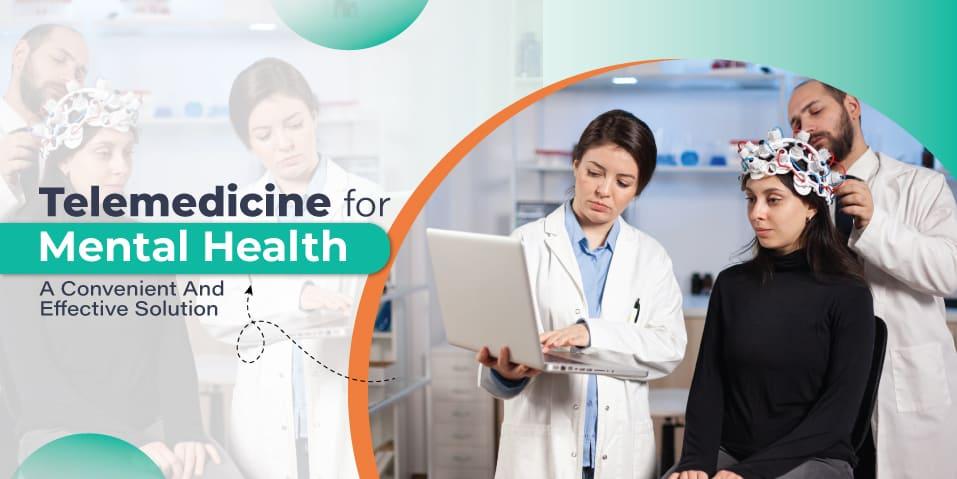Telemedicine for Mental Health: A Convenient and Effective Solution
Did you know that mental illness in health care is often under-represented? Mental healthcare is more likely to be in physical healthcare. They tend to have psychiatrists and psychotherapists. But mental health care is still essential, and Telemedicine has revolutionized mental health care by allowing patients to access mental health services from the comfort of their own homes.
Telemedicine services is a way of delivering health services over long distances. It has seen an incredible rise in the last few years as its benefits become more and more visible in mental health care.
Here’s an in-depth look at White label Telemedicine importance, mental illness facts, features, and use in mental health care settings.
Table of Contents
- Mental Health is a Worldwide Issue
- What is Telemedicine?
- Benefits of Telemedicine for doctors in mental illness
- How is Telemedicine used in mental health care?
- Telemedicine important in healthcare for mental illness
- Features of Telemedicine
- What is the scope of Telemedicine?
- Is depression a mental illness?
- What are some symptoms of depression?
- Tips to prevent effects of mental illness
- Conclusion
- FAQs
Mental Health is a Worldwide Issue
An important global issue, mental health has an impact on people, families, and communities everywhere. Anxiety, depression, and bipolar disorder are prevalent mental health conditions that can significantly lower a person’s quality of life. The COVID-19 pandemic has also brought attention to the need for more resources and assistance in the field of mental health. Many people are prevented from getting the treatment they require by the persistence of stigma and discrimination surrounding mental health disorders.
However, increased awareness and education can help reduce this stigma and encourage individuals to prioritize their mental health. It is crucial to address mental health as a global health issue and prioritize funding for mental health services and research.
We can fight to improve mental health outcomes and make sure that everyone has access to the tools and assistance they require by collaborating and advocating. It is time to give mental health the global attention it deserves because it is a crucial component of total wellbeing.
What is Telemedicine?
Telemedicine is the use of telecommunications to provide health care services. It allows doctors to treat patients remotely, often from their homes or offices.
In Telemedicine, a doctor can consult with a specialist in a different city or country who can diagnose and treat a patient’s condition more quickly than the specialist in the local area could.
Benefits of Telemedicine for doctors in mental illness
There are several benefits for doctors in mental illness, such as:
- Telemedicine can help to increase access to mental illness hospital
- It has the potential to reduce wait times for appointments
- Doctors can use telemedicine tools such as video conferencing and telehealth platforms to treat patients more effectively and efficiently
- Telemedicine also allows doctors to collaborate with specialists in other medical fields, boosting patient treatment options.
- It can help to reduce the stigma associated with mental health conditions.
How is Telemedicine used in mental health care?
Telemedicine has been increasingly used in mental health care in recent years. Here are some of the ways it’s being used:
- Most telemedicine services use video conferencing or virtual reality to allow doctors and patients to interact more effectively. This can be useful for treating conditions such as anxiety, depression, and bipolar disorder.
- Telehealth platforms also offer an online platform where patients can access their recorded health data and consultations with a doctor. This can help them track their progress and receive treatment advice.
- Doctors can use telemedicine tools to treat patients in their homes or offices, reducing the stigma associated with mental health conditions and making treatment more accessible.
Telemedicine important in healthcare for mental illness
Telemedicine has seen incredible popularity in mental health care in recent years. There are several reasons for this:
- Telemedicine tools allow doctors to treat patients more effectively and efficiently than is possible with face-to-face visits.
- It can reduce appointment wait times, resulting in faster treatment uptake.
- Doctors can use telemedicine platforms to collaborate with specialists from different medical fields, boosting patient treatment options even further.
- The technology also reduces the stigma associated with mental health conditions, making it more acceptable for patients and healthcare providers.
Features of Telemedicine
Several features of Telemedicine make it an essential part of mental health care:
- Telemedicine platforms allow doctors and patients to interact in a video format. This can be useful for treating conditions such as anxiety, depression, and bipolar disorder.
- Patients can access their recorded health data and consultations with a doctor on the platform. This can help them track their progress and receive treatment advice from experts in multiple fields.
- Doctors also use telemedicine tools to treat patients in their homes or offices, reducing the stigma associated with mental health conditions.
This can make treatment more accessible to those who might not be able to travel or meet in person with a doctor. As a result, the future of mental health care Telemedicine is becoming an increasingly important part of mental health care.
It can allow doctors to treat patients more effectively and efficiently, reduce appointment wait times, and boost patient treatment options. With telemedicine tools becoming more affordable and accessible, the future looks bright for those affected by mental illness.
Telemedicine platforms allow doctors to
- View patient records in real-time or on a schedule.
- Speak with patients using video conferencing or telehealth tools.
- Cooperate with specialists from other medical fields, if necessary.
- While Telemedicine is most commonly used in mental health care, it can be used in various other medical settings. For example:
- Cardiovascular care providers can use Telemedicine to monitor patients’ heart health remotely.
- Plastic surgeons can use mental telehealth to perform surgery remotely if the patient cannot travel.
- Dentists can use Telemedicine to provide dental care to patients who can’t travel.
What is the scope of Telemedicine?
Telemedicine is a broad term that refers to medical technologies to provide care and treatment from a distance. For example, in mental health care, telemedicine tools are used to treat patients more effectively and efficiently than traditional visits can. Telemedicine is also used in various medical settings, such as cardiology, dentistry, and plastic surgery.
Is depression a mental illness?
Depression is a mental illness that can significantly impair daily activities and quality of life. Depression affects women more often than men, but it affects everyone to some degree. It is one of the most prevalent mental health conditions in the United States, affecting about 20 percent of adults at some point in their lives.
What are some symptoms of depression?
Symptoms may vary from person to person, but typically they include:
- Feeling sad or hopeless nearly every day
- Loss of interest in usual activities
- Sleep problems (insomnia or excessive sleepiness )
- Weight changes (e.g., increased appetite or weight gain, decreased interest in food)
- slowed thoughts or actions
- Increased anxiety or tension
Tips to prevent effects of mental illness
Some psychiatric telemedicine tips that can be helpful in prevention include:
- Maintaining good physical and mental health throughout your life.
- Seeking early intervention for behavioral problems, such as anxiety or substance abuse.
- Getting regular exercise and adequate sleep.
- Avoiding excessive screen time, such as using electronic devices in excess.
- Establishing supportive relationships with people who are healthy and positive role models.
Conclusion
In summary, Telemedicine is a safe, efficient, and cost-effective tool to improve mental health care delivery and has the potential to help make mental illness awareness to reduce in-person visits for patients who could benefit from care over the internet. It also improves access for people with mental illness who might otherwise not be able to get care at all.
In addition, telemedicine for psychiatry can help ensure that mental health providers are available 24/7 and reduce travel distances and wait times, which can be particularly significant in rural areas. However, further research is needed to examine telemedicine use in mental health care settings and its impact on patient outcomes.
FAQs
Q: How can telemedicine help clinics treat mental illness problems?
Telemedicine has several benefits that can help clinics treat mental illness problems. It can improve access to mental health services for patients in remote areas, eliminate the need for in-person visits, reduce wait times, and offer more flexible scheduling. Additionally, telemedicine can make patients feel more at ease and lessen the stigma associated with receiving mental health services.
Q: What types of mental health problems can be treated through telemedicine?
A: Telemedicine can be used to treat a variety of mental health problems, including anxiety, depression, Addiction, bipolar disorder, and post-traumatic stress disorder (PTSD) are a few examples. It can also be used for therapy sessions, medication management, and psychiatric consultations.
Q: Is telemedicine effective for treating mental health problems?
A: Yes, telemedicine has been shown to be effective in treating mental health problems. Due to its accessibility and ease, telemedicine is frequently favored by patients and, according to research, can yield results that are comparable to those of conventional in-person treatment.
Q: What are the potential drawbacks of using telemedicine for mental health treatment?
A: While telemedicine has several benefits, it is not without its potential drawbacks. Technical problems, including a bad internet connection or broken equipment, can interfere with telemedicine sessions. Additionally, some patients may prefer in-person treatment or have difficulty adjusting to telemedicine due to their mental health condition.
Q: Can telemedicine replace in-person mental health treatment?
A: While telemedicine can provide a convenient and effective alternative to in-person treatment, it is not a replacement for in-person mental health care. Some mental health conditions require more intensive treatment or may require in-person care due to safety concerns. Telemedicine should be seen as a complementary tool to in-person care, rather than a complete replacement.
Q: How effective is Telemedicine in treating mental illness?
There is limited evidence on the effectiveness of mental health telemedicine in treating mental illness. However, some studies have shown that it can be an effective way to provide care to people who would not otherwise be able to get the treatment they need.
Further research is needed to understand how Telemedicine may help patients with mental illness and determine its effectiveness.
Q: What are the benefits of Telemedicine for mental health?
The main benefits of Telemedicine in mental health care include the following:
- Improved access to treatment for people who would not otherwise be able to get care;
- Reduced travel distances and wait times;
- Use of technology that is safe and easy to use.




